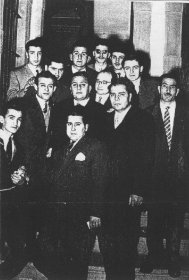Articles | Files | Interactive | Lists | Specials
The Rahbani Brothers Biography
|
Part 3: Professional artistic careers, radio and Fairuz: After studying at Alexy Boutrous' art academy, Assy got enrolled in the national conservatoire to study music. The Rahbani brothers began to seriously think of adapting art as means of living. They started writing three minute songs contrary to what was common at the time. They also began to produce folkloric concerts at the Antelias Club, as well as one act plays like A Wedding in the Moonlight and War Merchant. These were the first times they presented works of their own to big audiences, and the warm reception they received encouraged them greatly. Fouad Qasem, a novelist, was a manager in the Lebanese Radio. When he heard the songs of the Rahbani brothers, he liked them and therefore tried and succeeded in convincing Assy to resign from the police and join the station as a musician and a composer. The orchestra of the station was headed by Khaled Abulnasr, and had members including Tawfeek Elbasha and others. When Mansour used to finish his job at the police, he would go to the station and together with this brother, they started to write compositions and songs, and signed them by the name which was coined forever later, the Rahbani brothers. They together with Elbasha started taking music lessons. At that time, Tawfeek Sokar returned from Paris, and with him they exchanged what they knew of music. Assy was responsible for writing music for a number of programs, and with Mansour, they expanded their time slots in the radio station. The audience was very receptive of the brothers and demanded more of their works on the radio and in live concerts. In the late forties, Fairuz joined the radio station, and worked with the Rahbani brothers. Her first song written by Assy was a Qabalan Mekarzel poem called 7abatha Ya Ghoroob. They also gave her many other songs that were previously written or totally new original material like Zouraq Elhob Lana, Hayfa wel Deeb and Itab which was very important in increasing their popularity. In the early fifties, because of the originality of their works, a lot of people were interested in working with them, and so it was that Sabri Elsharif, the music manager in the Near East radio station and Mohamed Elghosainy its manager, offered them to work for the station. The station was controlled and financed by the British. Elsharif headed to Beirut to meet with them and he didn't leave back to Cyprus, where the station was located, until he had them sign a contract. Afterwards, Elsharif was responsible in moving the offices of the station from Cairo to Beirut because he sensed there were new and very important talents there. These also included Tawfeek Elbasha, Zaki Nassif, Abdelghani Sha'ban and Tawfeek Sokr. And together with Nassif, Elbasha and Sokr, the Rahbani brothers had formed what was called Ousbet Elkhamsa. Everyone of them was making interesting efforts, and it's worth to note that Zaki Nassif wrote a duet called Howa wa Heya and he sang it with Fairuz. Mansour later resigned from the police force and focused on his job at the station. The station was an important stage in the lives of all of these artists because of its wide regional coverage, and therefore their popularity was spreading in most of the Arab world. Assy and Mansour started writing sketches and duet songs for Fairuz, Wadi Elsafi, Sabah and others. They also added to the traditional songs lines, music and more melody, aside from adapting foreign songs and music and arabizing them. They helped revive some forgotten Arabic music generas including elmousha7at. They also focused on sung poems. Sabri Elsharif helped them tremendously by providing 40 or 50 member orchestras and more space and time to write and perform their material. The Rahbani brothers were also responsible for opening space for commercials on radio and they even wrote the music for some of the products, the first one was for Krosly fridges, it had lines going like "Krosly Krosly Brad Krosly Wa'ef Beldar Yer'osly!"
During that time, Assy and Fairuz had fallen in love and in 1954 they got married. The following year, they went to Egypt to work in the Sout Elarab radio station for six months. They wanted to do something for the Palestinian cause and they wrote the Rajoon operetta. Because of the beauty and strength of it, the acclaimed journalist Michel Abou Jawda called the Rahbani brothers the Fathers of the Sacrificial Work/Abaa Elamal Alfedayee. They also wrote many songs and sketches, and worked with Egyptian singers like Karem Mahmoud. After the six months ended, they were in Beirut again, and Fairuz was pregnant with Ziad. Philemon Wahbi offered to present the Rahbani brothers to the manager of the Damascus radio station, Ahmed Esa who was himself appreciative of new and original material. After two meetings, he was convinced and gave all the help he can to the brothers to work in the facilities of the station. From there many works were made popular including Itab, Nehna wel Amar Jiran, Mechwar and other big songs and programs. The Rahbani brothers used to go there every week or two presenting their new material before returning to their work at the Near East station. However after the three force attack against Egypt in 1956, the Rahbani brothers together with the other artists decided to stop working and boycott the Near East radio station because of its bias and antiarab propaganda. It also had its name changed to Sout Britania. Suffice it to say, the station was troubled financially and legally afterwards and was stopped for good.
|
Part: 1 | 2 | 3 | 4 | 5 | 6
